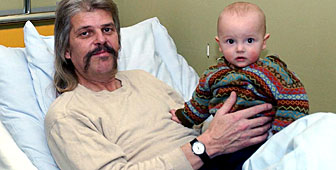Cannabis grower released from custody

A Swiss judge has released one of Switzerland's biggest cannabis growers from police custody.
Bernard Rappaz, 49, who had been on a hunger strike for more than 70 days, was jailed last November after police raided his cannabis farm in Charrat in the Valais and seized 50 tons of marijuana and other cannabis-based products. He was being held in the prison unit of a Geneva Hospital.
The cantonal court in Valais ruled on Friday that there was no longer a risk of collusion in the legal case involving Rappaz. At the same time the court stated that a hunger strike was not sufficient cause for a prisoner being released.
During Thursday’s hearing, the public prosecutor said “intolerable pressure” had been put on the authorities to release Rappaz.
Rappaz, who styles himself as the ultimate rebel – the “William Tell” – among Swiss cannabis growers, has been on a collision course with the authorities for several years over what he describes as the legal “grey area” surrounding the drug in Switzerland.
Status in Parliament
Last month the Senate approved a government proposal to allow the consumption of cannabis. If approved by the House of Representatives, the production and trade in cannabis could become legal under certain conditions.
This is the second time that Rappaz has challenged the authorities by starving himself. He went on a hunger strike in 1996 but was released after 40 days.
According to his lawyer, Abu Neeman, Rappaz, who has lost 24kg, is seriously weak, needs a walking stick to move around and can only speak in a whisper.
Rappaz’s release comes less than 24 hours after the publication of a controversial report commissioned by the Council of Europe that praised Swiss drugs policy.
Drug report
The report, written by British MP Paul Flynn, looked at the different ways countries tackle illegal drug abuse. Flynn focused on the policy of damage limitation practised by Switzerland and the Netherlands and compared it to the strategy of repression adopted by Britain and Sweden.
Flynn found no evidence to show that tougher legislation had any effect on drug consumption. He suggested that nations should set themselves “realistic goals” to reduce the risks associated with drug abuse, citing the pragmatic approach by the Dutch and Swiss authorities as the way forward.
“The Swiss government has had notable success … in stabilising and then reducing the number of drug-related deaths since 1994,” reads the conclusion of the report. “It is important that all member states recognise and note the lessons learned by this success.”
swissinfo with agencies

In compliance with the JTI standards
More: SWI swissinfo.ch certified by the Journalism Trust Initiative
You can find an overview of ongoing debates with our journalists here . Please join us!
If you want to start a conversation about a topic raised in this article or want to report factual errors, email us at english@swissinfo.ch.